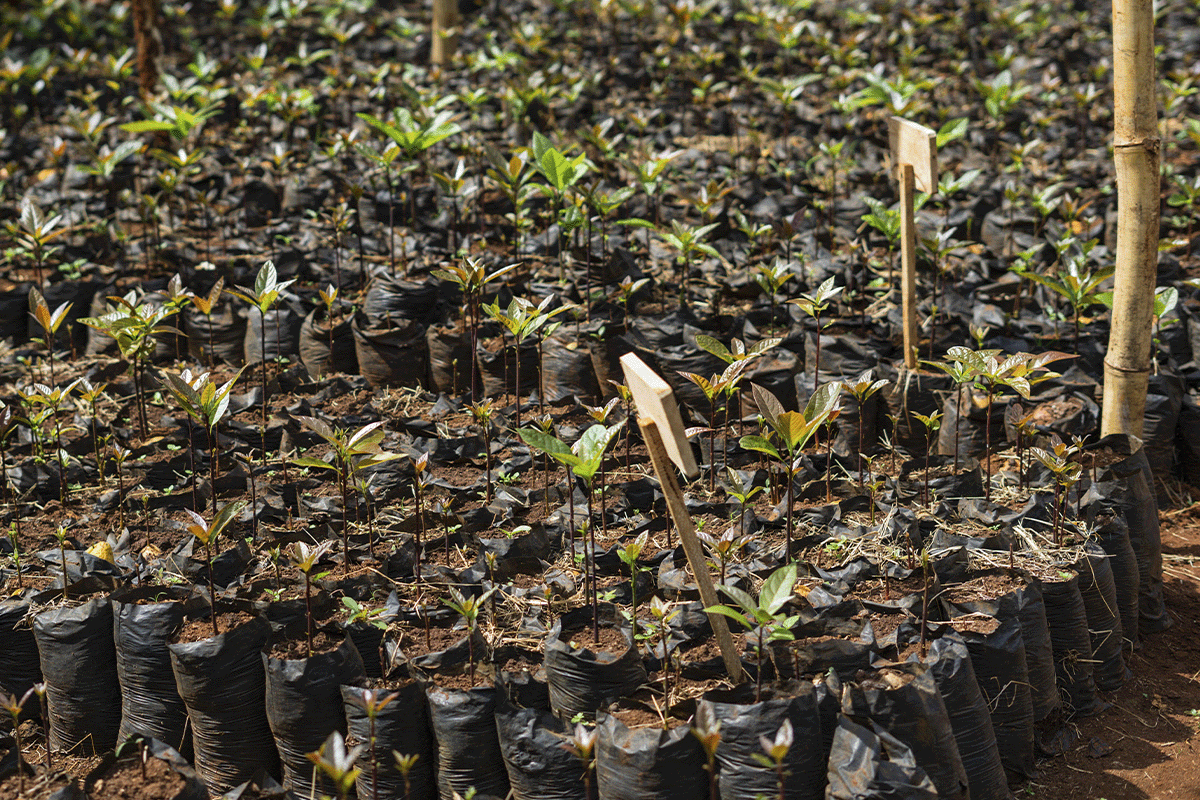In an era marked by environmental concerns, businesses face growing pressure to take meaningful action. Sustainability is no longer a buzzword; it's a necessity. Here's a compelling perspective that sets the tone for our discussion: In 2020, a staggering 51 billion tonnes of carbon dioxide were emitted globally. However, amidst these challenges, a remarkable opportunity has emerged—the rise of nature-based solutions (NBS).
 Drone view of a tree nursery - Hongera Reforestation Project, DGB.
Drone view of a tree nursery - Hongera Reforestation Project, DGB.
This blog post explores the world of NBS and, more importantly, highlights the substantial benefits they bring to businesses. NBS isn't just about offsetting carbon emissions; it's a pathway to environmental stewardship that can yield a multitude of advantages, offering a compelling reason why businesses should integrate them into their sustainability strategies.
Join us on this journey as we uncover how NBS can not only mitigate environmental impacts but also bolster the bottom line, making a powerful case for their adoption in today's corporate landscape.
Understanding nature-based solutions
Nature-based solutions (NBS) are initiatives aimed at restoring, preserving, or enhancing natural ecosystems to counterbalance the environmental impact of human activities whilst sequestering carbon emissions. These projects harness the power of nature to address a wide range of ecological challenges.
 Locals receiving new cookstoves as a part of the Hongera Energy Efficient Cookstoves Project, DGB.
Locals receiving new cookstoves as a part of the Hongera Energy Efficient Cookstoves Project, DGB.
While many NBS play a vital role in offsetting carbon emissions, their objectives extend beyond this. High-quality NBS, such as those offered by DGB Group, emphasise not only carbon sequestration but also ecosystem restoration, biodiversity preservation, and habitat creation. In addition, NBS can offer many community benefits, such as farmland restoration, job opportunities, training, and the provision of energy-efficient cookstoves and fruit-bearing trees.
Explore DGB’s carbon removal and biodiversity projects
Biodiversity is the cornerstone of thriving ecosystems and is essential for the wellbeing of all life. NBS focus on promoting biodiversity through reforestation, habitat restoration, and creating sustainable environments. These efforts are therefore vital to mitigate climate impacts but also play a crucial role in countering biodiversity loss.
The business case for nature-based solutions
The corporate world is witnessing a seismic shift towards sustainability. An increasing number of large companies, investors, and consumers are prioritising sustainability in their decision-making processes. A recent survey revealed that 78% of consumers are more likely to support companies with a clear sustainability strategy. Recent data also reveals a shift in corporations committing to green initiatives: from 23% in 2019 to an astounding 42% in 2022 among the Fortune Global 500.
Businesses should invest in NBS for several compelling reasons. Firstly, as the global community increasingly focuses on addressing climate impacts, NBS offer a tangible and effective means for businesses to reduce their carbon footprint and actively contribute to carbon sequestration. This aligns with the growing expectations of consumers, investors, and regulatory bodies and positions companies as responsible environmental stewards. Secondly, NBS go beyond carbon offsetting, delivering a myriad of environmental and social benefits, including improved air quality, biodiversity preservation, job creation, and community engagement.
These multifaceted advantages bolster a business' sustainability credentials and enhance its reputation and stakeholder relationships. Moreover, with increasing regulatory scrutiny and the rising importance of transparent reporting, investing in NBS allows companies to navigate compliance requirements and demonstrate their commitment to Environmental, Social, and Governance (ESG) principles. Therefore, businesses should invest in NBS not only for environmental and social reasons but also as a strategic move to thrive in a sustainability-focused world.
Read more: How nature-based projects contribute to net-zero goals
The benefits of NBS for businesses are manifold. Let's explore these advantages in more detail.
Environmental and social benefits
Carbon sequestration
One of the most compelling benefits of NBS for businesses is carbon sequestration. Nature-based projects act as nature's carbon sinks, absorbing and storing vast amounts of carbon dioxide from the atmosphere. In 2020 alone, NBS globally sequestered an estimated 2.4 billion tonnes of CO2. This not only helps mitigate climate change but also allows businesses to take significant strides towards achieving carbon neutrality.
 Close-up of seedlings in a tree nursery - Hongera Reforestation Project, DGB.
Close-up of seedlings in a tree nursery - Hongera Reforestation Project, DGB.
Air quality improvement
Beyond carbon sequestration, NBS contribute to improved air quality. The restoration and preservation of natural ecosystems result in cleaner air, reducing health-related costs for both employees and communities surrounding businesses. Cleaner air enhances individuals' wellbeing and reduces healthcare expenses for companies, contributing to a healthier bottom line.
Read more: Breathe easy: How trees are nature's air-cleaning machines
Habitat and biodiversity preservation
Thriving ecosystems are hubs of biodiversity, hosting a diverse array of flora and fauna. NBS play a pivotal role in preserving habitats and safeguarding endangered species. By supporting these projects, businesses actively participate in conserving the planet's rich biodiversity. This benefits ecosystems and aligns with the growing demand from consumers and investors for ethical and environmentally responsible practices.
 Portrait of Bulindi chimpanzee Murry - Bulindi Chimpanzee Habitat Restoration Project, DGB.
Portrait of Bulindi chimpanzee Murry - Bulindi Chimpanzee Habitat Restoration Project, DGB.
Job creation
NBS often bring about tangible social benefits, including job creation. By investing in projects that restore and sustain ecosystems, businesses stimulate local economies, particularly in rural and underserved areas. These projects provide employment opportunities, empowering communities and contributing to broader economic development.
 Artisans working in a cookstoves factory - Hongera Energy Efficient Cookstoves Project, DGB.
Artisans working in a cookstoves factory - Hongera Energy Efficient Cookstoves Project, DGB.
Education and training
Communities involved in NBS gain valuable knowledge about sustainable practices. This knowledge transfer goes beyond immediate employment and equips local populations with skills in ecosystem management, sustainable agriculture, and conservation. This educational aspect strengthens communities, making them more resilient to environmental changes.
Income from yields
Sustainable forest and land management within NBS can provide a sustainable source of income for local populations. These projects also often provide yield-bearing seedlings to farmers to reduce reliance on forest resources. By integrating these eco-friendly practices into NBS, businesses foster economic stability within communities, reducing reliance on environmentally destructive activities like deforestation.
Community engagement
NBS foster a sense of ownership and pride among local communities. By involving local communities in the planning and execution of projects, businesses create a positive impact on social cohesion. Engaged communities are more likely to support businesses with strong sustainability initiatives, translating into increased local goodwill and potential customers.
 Local community with new cookstoves as a part of Hongera Energy Efficient Cookstoves Project, DGB.
Local community with new cookstoves as a part of Hongera Energy Efficient Cookstoves Project, DGB.
Regulatory and reporting considerations
Regulatory landscape
Governments worldwide are tightening regulations related to carbon offsetting and sustainability reporting. Complying or aligning with these regulations is a strategic move to mitigate risks and create business resilience. By participating in NBS, businesses position themselves to meet or even exceed these evolving regulatory requirements, reducing compliance-related uncertainties.
Transparent reporting
Transparent reporting on NBS is essential for stakeholders. Investors, consumers, and partners increasingly scrutinise a company's commitment to Environmental, Social, and Governance (ESG) criteria and Socially Responsible Investing (SRI). Transparent reporting not only aligns with these expectations but also serves as a competitive advantage, bolstering a business's reputation and attractiveness to investors.
Read more: The power of sustainability: Why investing in sustainability drives faster company growth
Additional benefits of nature-based solutions for businesses
Reducing carbon footprint
Reducing your company's carbon footprint through NBS is not just an ecological win but also a strategic advantage. As businesses globally actively work towards carbon reduction goals, they improve their resilience to potential carbon-related regulations and demonstrate a strong commitment to environmental sustainability.
Measure your carbon footprint
Achieving carbon neutrality
NBS offer a clear pathway to achieving carbon neutrality or net zero, a significant milestone that enhances a company's sustainability credentials. Carbon neutrality is a testament to a business's environmental commitment and a powerful marketing tool that resonates with eco-conscious consumers.
 Close up on a local holding a tree seedling in a tree nursery - Hongera Reforestation Project, DGB.
Close up on a local holding a tree seedling in a tree nursery - Hongera Reforestation Project, DGB.
Enhancing sustainability credentials
In a world where consumers and investors value businesses committed to environmental sustainability, NBS offer a tangible way to strengthen sustainability credentials. A strong sustainability reputation can increase brand loyalty and trust and create a competitive edge in the market.
Increasing revenue
Sustainable practices associated with NBS can create new revenue streams for businesses. These may include eco-friendly product lines, partnerships with environmentally conscious suppliers, or collaborations with like-minded organisations. By aligning their business models with sustainability, companies can tap into a growing market of environmentally conscious consumers. Sustainable practices can also lead to significant cost savings by eliminating inefficiencies in operations.
Building brand awareness
Supporting nature-based projects demonstrates a clear commitment to the environment and community wellbeing. This commitment enhances brand awareness and reputation, as consumers are more likely to support businesses that actively contribute to positive environmental and social change.
Employee engagement
Investing in sustainability initiatives plays a crucial role in fostering a positive work culture and drawing in top-tier talent. When employees are part of an organisation that aligns with their personal values and showcases a commitment to social and environmental responsibility, it sparks heightened engagement and motivation. Research demonstrates that companies with a strong commitment to sustainability enjoy a 55% boost in morale, a remarkable 38% increase in employee loyalty, and a notable 16% uptick in overall productivity.
Read more: How to stay ahead of the curve on sustainability
Challenges and best practices of nature-based solutions for businesses
Despite the many benefits, businesses may encounter challenges when selecting or implementing NBS. Common hurdles include selecting suitable projects, making a long-term commitment, and ensuring the long-term success of initiatives. To overcome these challenges, here are some best practices:
- Thorough project selection: To overcome the challenge of project selection, businesses should conduct thorough assessments. This includes evaluating how a project aligns with its sustainability goals, its potential long-term benefits, and its compatibility with the local ecosystem. Businesses should also ensure that the project is registered with a leading certification body to ensure the quality of the project.
- Long-term commitment: Recognising the need for long-term commitment is essential. Sustainable impact takes time to materialise. These projects often deliver benefits over an extended period rather than immediate returns. Businesses should create strategies that ensure their continued involvement in nature-based initiatives, even beyond initial implementation.
- Measurement and reporting: Implementing robust monitoring and reporting mechanisms is critical. It allows companies to track the impact of NBS over time accurately. This data helps assess the project's success and demonstrates the organisation's commitment to sustainability, which can attract investors and stakeholders. Businesses should further ensure that the project is subject to stringent reporting requirements in accordance with leading methodologies, such as those from Verra or the Gold Standard.
Read more: Net zero: benefits, challenges, strategies, and the power of nature-based solutions
By addressing these challenges with these best practices, businesses can effectively leverage NBS to enhance their environmental and social responsibility efforts while reaping long-term benefits.
Case studies of businesses utilising nature-based solutions
Meta
Meta, formerly known as Facebook, is committed to sustainability, with a goal to achieve net-zero emissions by 2030. They have already made significant progress, reaching 86% renewable energy sourcing by 2020. Additionally, Meta is actively addressing water scarcity issues by targeting 100% water replenishment in water-stressed areas by 2030. It leverages its platforms to promote climate-related content and empower users to take climate action.
Read more: Meta’s journey to sustainability: pioneering net-zero emissions
A significant milestone in Meta's sustainability journey is its recent partnership with Aspiration, where they purchased 6.75 million carbon credits. This investment in carbon credits demonstrates Meta's dedication to NBS and mitigating carbon emissions. By supporting nature-based projects that reduce greenhouse gas emissions, Meta contributes to the transition towards a low-carbon economy, making a positive environmental impact.
BHP
BHP, a leading natural resources company, is committed to biodiversity conservation and sustainable development. They actively invest in biodiversity credits, like the Cerrado restoration project in Brazil, to mitigate the environmental impact of its operations. This initiative has successfully restored vital habitats, improved water quality, and empowered local communities.
Read more: BHP: investing in biodiversity conservation through offsetting
Complementing its biodiversity credits, BHP has a comprehensive Biodiversity Management Plan focused on reducing emissions, enhancing water management, and conserving critical biodiversity areas. Its transparent reporting and recognition from organisations like the Dow Jones Sustainability™ World Index underline its dedication to sustainability and biodiversity conservation, making BHP a trailblazer in sustainable practices.
The positive impacts of DGB Group’s nature-based solutions
NBS are not just a means to address carbon emissions; they represent a holistic approach to sustainability. The positive impacts of DGB’s NBS are a testament to the transformative power of nature-based projects. Our projects involve reforestation, afforestation, and energy-efficient cookstove initiatives. We work closely with local communities, governments, and other stakeholders to ensure that our projects are socially and environmentally responsible and provide tangible benefits to the people and ecosystems they serve. All our projects are also verified by leading certification standards to ensure their quality and impact.
Contact us to start your sustainability journey
As businesses navigate the challenges of a changing world, embracing these projects is not just a possibility; it's a strategic imperative. By investing in NBS, businesses can reduce their environmental footprint, foster social wellbeing, and position themselves as leaders in corporate sustainability.
Invest in nature-based solutions with DGB









